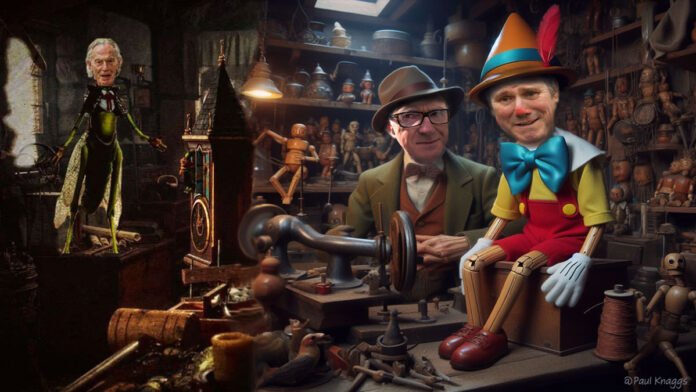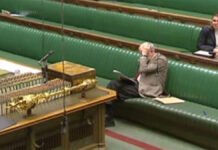The Long Grift, a Grift of Mass Deception.
Grifters come in various guises. The archetypal grifter is the smooth-talking con artist accumulating riches through scams and deception. But the political grifter also flourishes – cunning operators leveraging positions of public trust for entry into elite circles of influence and affluence.
Rather than pickpocket the vulnerable, these grifters target the body politic itself. They sing seductive songs of change to gain power, later shedding populist skins when opportunity beckons.
The political grift follows a well-worn path – ascending the ranks in parliament or Congress before cashing in through the “revolving door.” This passage seamlessly transports politicians into plush positions within corporate boardrooms, banking, or lobbying firms.
Here ambitious player-politicians gleefully shed cumbersome ideals. Now they can join the globalist bonanza, claiming their rich rewards in return for services rendered while in office. Cynics say the grift was ongoing throughout public tenures. Outrageous speechifying and posturing aimed to impress future prospective employers rather than motivate real shift.
Followers of Noam Chomsky will recall how he spotlighted Obama’s grift in real-time during his presidency. Obama swept into office on a wave of populist rage after the 2007/2008 financial crisis. His platitudes promised hope and change for an angry public stripped of economic security.
Yet Chomsky called out Obama as an establishment Trojan Horse from day one. His meteoric rise and messiah-like image aroused suspicion. Lo and behold, Obama’s tenure protected status quo interests. His administration engineered the greatest upward transfer of wealth in history – redistributing billions from public hands into the pockets of private banks and financial institutions.
Obama won accolades for “stabilising markets,” while ordinary citizens faced job losses, austerity cutbacks, and Predatory crisis exploitation. Chomsky points out the cynical ploy of offering false prophets to absorb revolutionary steam when public anger threatens prevailing power structures.
Obama’s primary function was quelling class tensions through his cult of personality. He achieved record banker bailouts while placating calls for pitchforks. The masses gratefully accepted meagre crumbs while financiers feasted, saved from accountability by their political guardian angel. In Chomsky’s eyes, Obama was a manufactured release valve to ease pressure for root and branch reform after the economy exposed its glaring cruelties.
The old tricks are the best tricks
Unfortunately, in today’s landscape, numerous politicians fall into this category. However, there exists another type of grift, one that operates in a more subtle manner…
Here we meet that other sort of grifter…The grifters that enter as Trojan Politicians, installed to thwart change from within. Having risen meteorically, they pay lip service to populist movements while quietly serving their establishment masters.
Their assigned role is containing radical momentum through endless delays and distractions. Always another crisis appears, perpetually postponing progressive pledges.
So manifestos gather dust as people grow frustrated. The grifting interlopers act as turnstiles, allowing motion but never the final passage to substantive policy. They are governing bodies devoid of conviction or soul, vacant overseers, devoted only to fostering inaction.
For their compliance and obedience, political accomplices can expect rich rewards. A guaranteed trajectory leads them through the spinning doors into lobbying and corporate consultation.
But for people seeking transformative vision, these illusions of leadership are costly. The bait gets people halfway down the path before they realise it goes nowhere.
This is the 21st century and we all understand how the establishment utilises every tool at its disposal to both make and break politicians. To undermine popular movements and those that lead them.
We witnessed this with the calculated assassination of Jeremy Corbyn, character, as lies piled upon lies and then blared through ubiquitous media channels.
What remains less evident is what follows the fall of popular leaders.
The Continuity Candidate.
What receives less scrutiny is the meticulous orchestration surrounding Corbyn’s successor, Sir Keir Starmer. The establishment press provides fawning coverage, granting their darling levels of puffery beyond even Boris Johnson’s cult of personality. Starmer has become the system’s Manchurian candidate, an establishment stodge.
Starmer has recently embarked on a campaign to win back the Red Wall, the traditional Labour heartlands. He speaks of revitalising manufacturing and adopting a tough stance on crime.
This is Starmer’s slick general election bid that provides ample cover for business as usual. Starmer increasingly resembles a David Cameron tribute act, devoid of conviction politics or concrete vision. His new working class posturing follows years of loyalty serving institutional powers deeply invested in preventing fundamental change.
For an establishment desperate to regain tight control, Starmer offers familiar and reassuring stewardship. But his links and records invite scepticism from those seeking transformative left agendas.
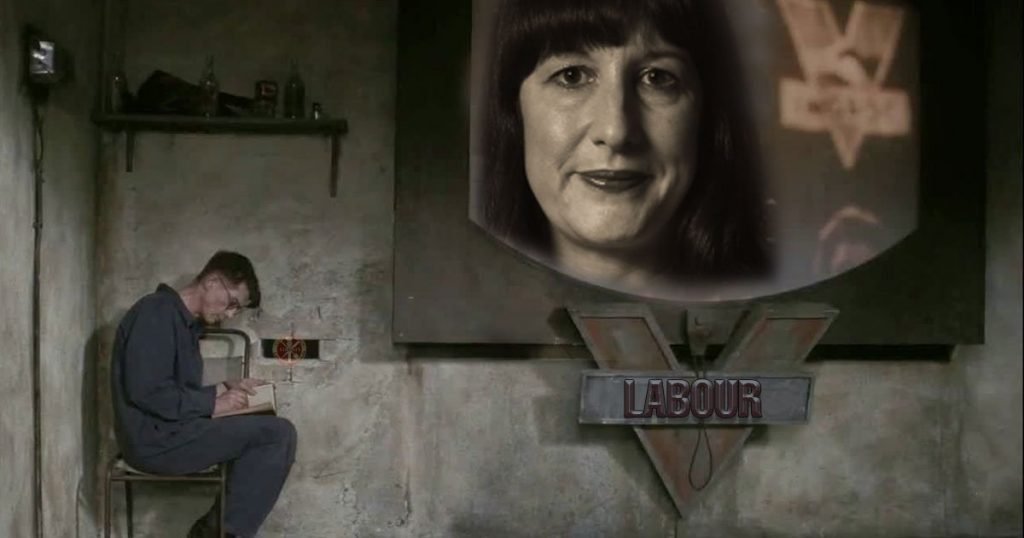
Starmer’s Dubious Working-Class Narrative: A Flawed Portrait of Authenticity
To court working class voters, Starmer touts his background as the son of a factory floor toolmaker. But peek behind the veil and cracks emerge in this narrative. Turns out his father owned an independent toolmaking firm, devoid of managers lording over factory workers. Already Starmer’s tale feels more scripted than authentic.
One might be tempted to let it slide if it weren’t for the fact that Starmer leans so heavily on this fabricated image. Moreover, it is rather insulting to suggest that a toolmaker would be looked down upon, which Starmer does…
During his speech at the TUC, Keir Starmer recounted an anecdote about his father, a skilled toolmaker who allegedly felt looked down upon for working on the factory floor.
During a speech at the TUC, Starmer claimed:
“Despite being a skilled toolmaker throughout his working life, my dad thought people looked down on him because he worked on the factory floor. He was right about that.”
His vivid anecdote about others scorning his dad for manual labour exposes Starmer’s upper middle-class disconnect. In all blue-collar communities, skilled tradespeople enjoy tremendous respect, their expertise honed over years. Starmer betrays ignorance by implying contempt for the dignity of craft and graft.
It exposes a revealing slip that sheds light on Starmer’s true background, contrasting with the official version he peddles.
At that moment, an instinctual feeling arises, suggesting something amiss, a lack of authenticity in Starmer’s words.
Starmer’s father, in reality, operated the Oxted Tool Co. His own independent toolmaking enterprise until the 1990s. By all accounts, he was a proficient self-employed tradesman, devoid of superiors or overseers, operating from a rented workshop on an industrial estate rather than a conventional factory setting.
In an ideal political landscape focused on substantive policies rather than theatrical portrayals of “the worker,” the specifics of Starmer’s father’s profession should hold little relevance. Alas, the current state of affairs has brought us to a point where such details seem to take centre stage, overshadowing more crucial matters.
In Volume 18, issue 3 of Barn Theatre News, printed in August 2014, Rod Starmer wrote about his son. He said that before university Keir took a year off:
“The next 6 months were spent in my factory operating a production machine…DEAD BORING…..Keir!! At Leeds, Keir obtained a first in Law, LLB and a Scholarship to Oxford for a second degree, BCL.”

A Back Story by Design
When examining Starmer’s personal history, a stark disparity emerges between truth and reality. It feels off-sync, contrived, resembling the plot of the Manchurian Candidate. One must question the extent to which the establishment is determined to prop him up.
Why, indeed, does a mediocre politician like Starmer, whose stagecraft resembles that of a man impersonating Rumpole of the Bailey, garner unwavering support from the establishment? And why is the media so firmly in his corner? Each time he delivers a major speech, we are left questioning the authenticity of his words, as they resemble nothing more than empty closing statements devoid of genuine conviction. After all, his promises and pledges hold as much substance as a bucket riddled with holes, then again, why should he even believe what he says? As things are going he will see office not on merit but simply because the Tories are so bad we have no other choice.
Beyond these dubious background claims swirl deeper queries. Why does such a mediocre politician gain backing from every pillar of the establishment?
Perhaps answers lie in Starmer’s membership of the elitist Trilateral Commission, rubbing shoulders with the world’s wealthiest figures. Their agenda is preserving commerce unhindered by civil rights meddling from unions or protesters. Starmer appears a willing custodian of vested interests rather than an advocate for working people.
Trilateral Commission

Let us not forget that Starmer is a member of the elitist Trilateral Commission, a symbol of establishment power that believes in managing people rather than representing them. This group of wealthy individuals aims to ensure smooth commerce and unhindered profits, with no tolerance for unions or civil rights organisations that might disrupt their agenda.
In today’s landscape of smoke and mirrors, we must scrutinize the carefully constructed facades of the powerful. Starmer’s links suggest he will govern more as a defender of the status quo than an agent of transformative change. His main skill seems crafting his public image with precision if not honesty. But the British people deserve leaders whose words ring true rather than simply polished. Authenticity requires no embellishment.
Of fairytales, The Red Knight
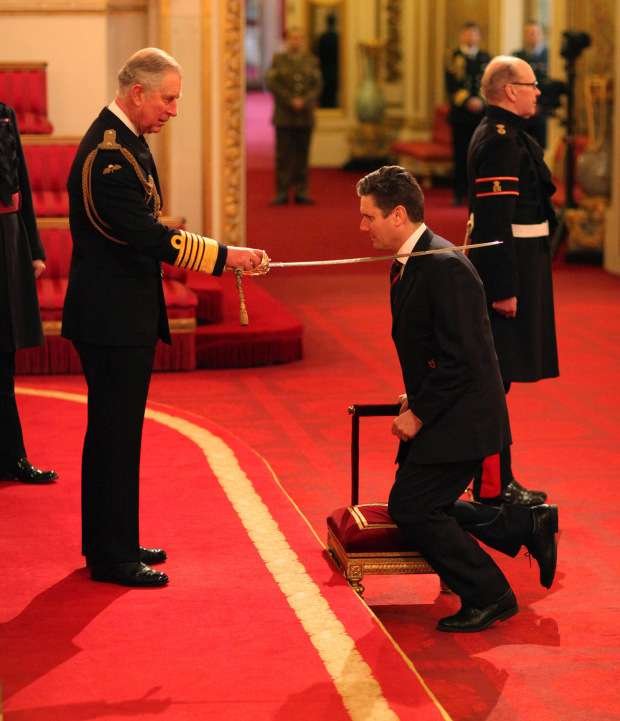
The book by Michael Ashcroft’s Red Knight contains many revelling aspects of Stramers life that he hoped would remain hidden. points made that if not contradict Starmer’s carefully crafted background at least ask some very awkward questions…This article contains abridged extracts…
Those who know Sir Keir Starmer well, often speak of his decency, integrity, intellect and reluctance to give too much away about himself.
However, Labour’s local elections trouncing in May spurred him to greater efforts on the self-promotion front.
The opening move was an interview on Piers Morgan’s Life Stories, in which he spoke tearfully and movingly about his mother’s life-debilitating illness.
With this biography, I have dug deeper than the ITV programme was able to, and can reveal details of its lasting effects on her elder son.
I will also describe how Sir Keir, a man of many contradictions, who attended a fee-paying school and Oxford University, has, in my view, overplayed his supposed working class credentials when friends and colleagues have confirmed to me that realistically he is anything but.
‘One of Keir’s faults, which has come out from time to time, is his wanting to insist how working class he is when he’s absolutely, plainly not,’ says Professor Bill Bowring, who teaches law at Birkbeck College, University of London.
‘If you’re a QC and former Director of Public Prosecutions, you’ve left your working-class roots far behind. That’s a weakness of his, to go on about it. He’s become very middle class.’

Sir Keir did not want this story to be written. Indeed, it is no exaggeration to say that he actively obstructed it.
While I am the first to accept that everybody is entitled to a private life, I also believe that any politician who presents themselves to the country as the Prime Minister-in-waiting should have a skin thick enough to be untroubled about a study of their character.
By having such a prickly reaction to my decision to write his story, Sir Keir has arguably shown more of himself than he perhaps realised.
Given that most of his career has been spent outside elected politics – he was a barrister from 1987 until 2008; the Director of Public Prosecutions (DPP) from 2008 to 2013; and only became a Labour parliamentary candidate in December 2014 – some probing is justified. So who is the man who would be Britain’s leader?
His mother Josephine’s path through life was far from straightforward. Aged 11, she was diagnosed with juvenile idiopathic arthritis, also known as Still’s Disease, after the English paediatrician George Still who first described it in 1896.
This rare illness is characterised by fever and a rash as well as joint pain, and it can have a profoundly destabilising effect on those who live with it. Sadly, Josephine was not spared the worst of what the disease is capable of inflicting.
According to the eulogy given at her funeral in 2015, she was quickly taken under the wing of the consultant who was in charge of her care, Dr Kenneth Maclean.
It was he who told Josephine and her husband Rodney on their wedding day in 1960 that if they intended to start a family, the unknown side effects of the pioneering cortisone treatment he was giving her meant they should not wait.
Rodney, who worked as a toolmaker in Ashford, Kent, and his bride took the advice seriously. In June 1961, Josephine gave birth to their eldest child, Anna. On September 2, 1962, Keir was born.
It is often stated as fact that he was named after Keir Hardie, a founder of the Labour Party, yet Starmer admitted in an interview in 2015 that he had no evidence for this because he had never discussed it with his parents.
Still, this idea has stuck and he has never disabused anybody of it.
After the move to Tanhouse Road in Oxted, Rodney continued to work in the toolmaking trade but, due to his son’s ambiguous explanations, there has always been a certain amount of confusion as to his employment status.
In March 2018, Starmer told the BBC’s Nick Robinson that his father ‘was a toolmaker working in a factory and working every hour, basically’. The following year, he told the BBC Radio 4 Today programme that his father ‘worked in a factory’ as a toolmaker.
The inference that listeners might have drawn is that Rodney Starmer was employed by somebody else. Yet the available evidence suggests that this was not the case.
For reasons best known to himself, Keir Starmer did not use any of these opportunities to explain that his father, in fact, ran his own business, the Oxted Tool Company.
As a Companies House representative has said that no records of the Oxted Tool Company exist in its files, it is difficult to assess how successful Rodney Starmer’s business became and indicates that he may have remained a sole trader – as opposed to running a limited company – throughout his working life.
As a skilled manual worker who was self-employed and who owned a house (albeit with a mortgage), it is arguable that Rodney would be thought of by some social scientists as being a cut above other toolmakers who were employed.
Working ‘in my factory.
The next 6 months were spent in my factory operating a production machine…DEAD BORING…..Keir!!
– Rodney Starmer
While Starmer has made frequent references to his toolmaker father, Dad Rodney once boasted that he ran his own factory. Reflecting on his son’s knighthood in 2014, Rodney Starmer wrote in Oxted’s theatre newsletter that his son had spent six months before university working ‘in my factory operating a production machine’.
That sort of gives the game away.
None of this would matter in any way, of course, but for the fact that Keir Starmer has not been totally explicit about it when asked.
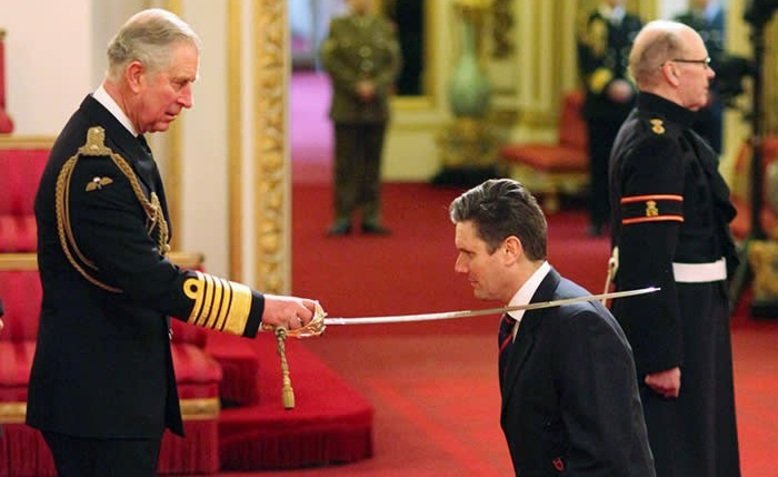
Perhaps it would be most accurate to say that Starmer’s background was neither working class nor ‘posh’, as some commentators have attempted to prove, but was instead closer to what sociologists would once have called petit bourgeois. This French term is akin to lower-middle class.
In 1974, Keir won a place at Reigate Grammar School, which would become independent during his time there. Those who were already pupils were allowed to continue, with their fees paid by the local council.
Starmer’s friends there included Quentin Cook, subsequently known as Norman and by his DJ name Fatboy Slim. They took violin lessons together, though Cook left Reigate Grammar aged 16.
Music remained a very important part of the life of Starmer, who also played the flute, piano and recorder. He was a good enough flute player to secure a place at the prestigious Junior Guildhall School of Music.
Every Saturday morning, at the insistence of his parents, he would travel to London for lessons by staff who played in professional orchestras. Very middle class.
It is noteworthy that when the Daily Mail discovered in September 2009 that Starmer had omitted to mention Reigate Grammar School in his Who’s Who entry, it concluded that this was a piece of chicanery which reflected badly on his character. By then, he was the Director of Public Prosecutions.
King of the Middle Class Radicals: That was grammar school-educated Sir Keir Starmer’s university nickname.

In March 2002, Starmer became a QC at the relatively early age of 39. A few months later he was mentioned in an Observer profile piece headlined The New Legal Crusaders, which focused on a group of ambitious young lawyers.
This article is noteworthy for the following sentence: ‘Among them was Ben Emmerson, the dashing young advocate and colleague of Cherie Booth at the fashionable Matrix Chambers.
‘Admirers say that if Colin Firth’s human rights lawyer in the film Bridget Jones’s Diary wasn’t based on Emmerson, then it should have been.’
These words solve a mystery which has portrayed Starmer in a very useful and flattering light for many years. Starmer always seemed happy not to disabuse people of the notion that he was the inspiration for the dashing Mark Darcy, who was created by author Helen Fielding. The fact is that he never was.
What appears to have happened is that in April 2012, a decade after the Observer article, a Sunday Times journalist interviewed Starmer.
‘Just before my interview with Keir Starmer, the director of public prosecutions (DPP), someone tells me that the chisel-jawed former human rights lawyer was the inspiration for Mark Darcy,’ she wrote at the time.
‘I am not sure if this is true.’ From that point on, other journalists decided that it was true and the myth held. Starmer never denied it, no doubt relishing the touch of glamour it gave him.
For example, during the Labour leadership contest, when ITV News asked him if the Darcy character was based on him, he answered: ‘Everybody asks me this question when they should be asking [Fielding] the question because she knows the answer and I don’t.’
Finally, it was Fielding herself who explained on Desert Island Discs last July that Starmer played no part in her thinking up Mark Darcy.
While this may seem to be a trivial matter, one friend of Starmer says it is rather revealing.
The Starmer whom this person knows apparently paid attention when members of the opposite sex said he was good-looking.
‘What’s interesting is he knows full well he wasn’t the model for Mark Darcy,’ says the friend. ‘His answers tended to leave the impression that it was true.’
Keir Starmer is often described as being intensely ambitious, yet it is arguable that this trait is at least in part a consequence of the hopes and dreams of his family.
The evidence for this comes from a round-robin letter written in December 2014 by Starmer’s father, Rodney. In it, he expressed to friends his delight that his son had just been chosen as Labour’s prospective parliamentary candidate in the safe Labour seat of Holborn and St Pancras.
‘We are very pleased and wish him well,’ Rodney wrote. ‘My dad, Bert, said many years ago that one of the Starmer’s should be an MP.’
Who can say why Starmer’s mechanic grandfather seemed fixed upon a family member making it to the House of Commons? But Keir will no doubt have known about this comment.
Maybe it stemmed from his great-uncle who was chairman of the Godstone Conservative Association. Politics in the family…
However, whoever did it came to pass.
It was a huge personal tragedy for Starmer that his mother did not live to see him become an MP in the General Election of May 2015. Very sadly, she died less than two weeks before polling day.
Now, six years later, many analysts are agreed that Starmer’s position on the political spectrum is difficult to define.
Immediately after he became leader, James Schneider, Jeremy Corbyn’s former head of strategic communications, wrote: ‘Keir Starmer is not a ghoulish neo-liberal, reactionary authoritarian, or a lover of war but he isn’t a socialist.
‘Hard to place, he appears to be on the progressive end of social reformism. He has no strong allergy to being near socialist ideas but they aren’t to his taste or style.’
Starmer has frequently presented himself as a socialist in public, but as is often the case with Sir Keir Starmer, the truth behind that claim is quite different.
When I receive emails questioning why Labour Heartlands and other Left-wing media outlets criticise Starmer more than the Tories, my response is simple:
“In the realm of political discourse, the Tories may engage in fierce opposition to socialism, deeming it an economic argument central to the ongoing debate on which political theory best serves the country and its people.
However, what distinguishes Sir Keir Starmer is not a simple difference of opinion. Rather, he transcends opposition and embraces the very neoliberal ideology he once purportedly stood against.
In a calculated manoeuvre, Starmer has ruthlessly abandoned Labour’s founding ideology, which once stood as a beacon for the emancipation of the working class. His actions defy the realms of ideology and economic theory; they constitute nothing short of an audacious act of outright sabotage. With Starmer any hope of a more equal just socially has gone, with Starmer any hope of socialism is dead!”
Starmer’s only role is to uphold the facade of democracy, creating the appearance of an alternative while ensuring that no true alternative exists. His position is designed to maintain the status quo, providing a semblance of choice while safeguarding the existing power structures.
First published 11/02/ 2022
Help Us Sustain Ad-Free Journalism
Sorry, I Need To Put Out the Begging Bowl
Independent Journalism Needs You
Our unwavering dedication is to provide you with unbiased news, diverse perspectives, and insightful opinions. We're on a mission to ensure that those in positions of power are held accountable for their actions, but we can't do it alone. Labour Heartlands is primarily funded by me, Paul Knaggs, and by the generous contributions of readers like you. Your donations keep us going and help us uphold the principles of independent journalism. Join us in our quest for truth, transparency, and accountability – donate today and be a part of our mission!
Like everyone else, we're facing challenges, and we need your help to stay online and continue providing crucial journalism. Every contribution, no matter how small, goes a long way in helping us thrive. By becoming one of our donors, you become a vital part of our mission to uncover the truth and uphold the values of democracy.
While we maintain our independence from political affiliations, we stand united against corruption, injustice, and the erosion of free speech, truth, and democracy. We believe in the power of accurate information in a democracy, and we consider facts non-negotiable.
Your support, no matter the amount, can make a significant impact. Together, we can make a difference and continue our journey toward a more informed and just society.
Thank you for supporting Labour Heartlands
